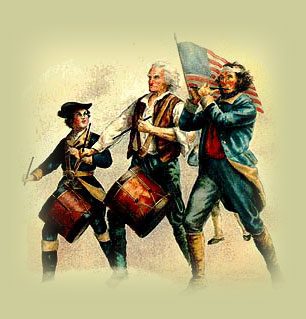Happy July 4th – Some Things to Remember
This July 4th as we enjoy our “beer, picnics and baseball games,” let’s not lose sight of the fact that many of the fifty-six signers of the Declaration of Independence risked and sacrificed much in support of the cause of independence.
Five signers were captured by the British.
George Walton was captured after being wounded while commanding militia at the Battle of Savannah in December 1778.
Arthur Middleton, Edward Rutledge and Thomas Heyward, Jr. were taken prisoner at the Siege of Charleston in May 1780.
Richard Stockton of New Jersey was “dragged from his bed at night” by local Tories and imprisoned in New York City’s infamous Provost Jail.
One lost a son serving in the Revolutionary Army, another had two sons captured.
Abraham Clark of New Jersey saw two of his sons captured by the British and incarcerated on the prison ship HMS Jersey.
John Witherspoon, also of New Jersey, saw his eldest son, James, killed in the Battle of Germantown in October 1777.
Many were driven from their homes and were constantly on the run.
Thomas McKean, a delegate to the Continental Congress, President of Delaware, Chief Justice of Pennsylvania, and Governor of Pennsylvania, wrote in a letter to John Adams in 1777, how he had been “hunted like a fox by the enemy, compelled to remove my family five times in three months, and at last fixed them in a little log-house on the banks of the Susquehanna, but they were soon obliged to move again on account of the incursions of the Indians.”
Many had their homes and property confiscated, vandalized and looted by the British.
Francis Lewis had his property raided and home destroyed. His wife was taken prisoner and jailed for several months before being exchanged for the wives of British officials captured by the Americans.
Philip Livingston lost several properties during the British occupation of New York, sold off others to support the war effort, and died suddenly in 1778, before the end of the war.
John Hart’s New Jersey farm was looted in the course of the Revolutionary War, and he had to go into hiding.
The properties of Samuel Adams, John Hancock, Benjamin Franklin, James Wilson, Benjamin Rush and Robert Morris, as well as signers Ellery, Hall, Clymer, Walton, Gwinnett, Heyward, Rutledge and Middleton, were also seized and occupied by the British during the war.
Some lost their fortunes.
Carter Braxton, a wealthy planter from Virginia, invested heavily in shipping, but lost his fortune when the British Navy sunk or captured most of the ships in which he held an interest.
One died in a duel.
Button Gwinnett of Georgia died from wounds he received, not at the hands of the British, but of a fellow American officer with whom he dueled in May 1777.
“We must all hang together or most assuredly we will all hang separately.” – Benjamin Franklin
The signers of the Declaration of Independence took a huge personal risk in daring to put their names on a document that repudiated the British throne. They had every reason to believe at the time that they might well be hanged for having done so. This was an act we should indeed remember and honor our Founding Fathers for having the courage to do. But hardships and losses were not endured by our Founding Fathers alone, they were also visited upon many of our brave forefathers who gave their lives for this noble country during its struggle for independence.
Remember, freedom is never free!
